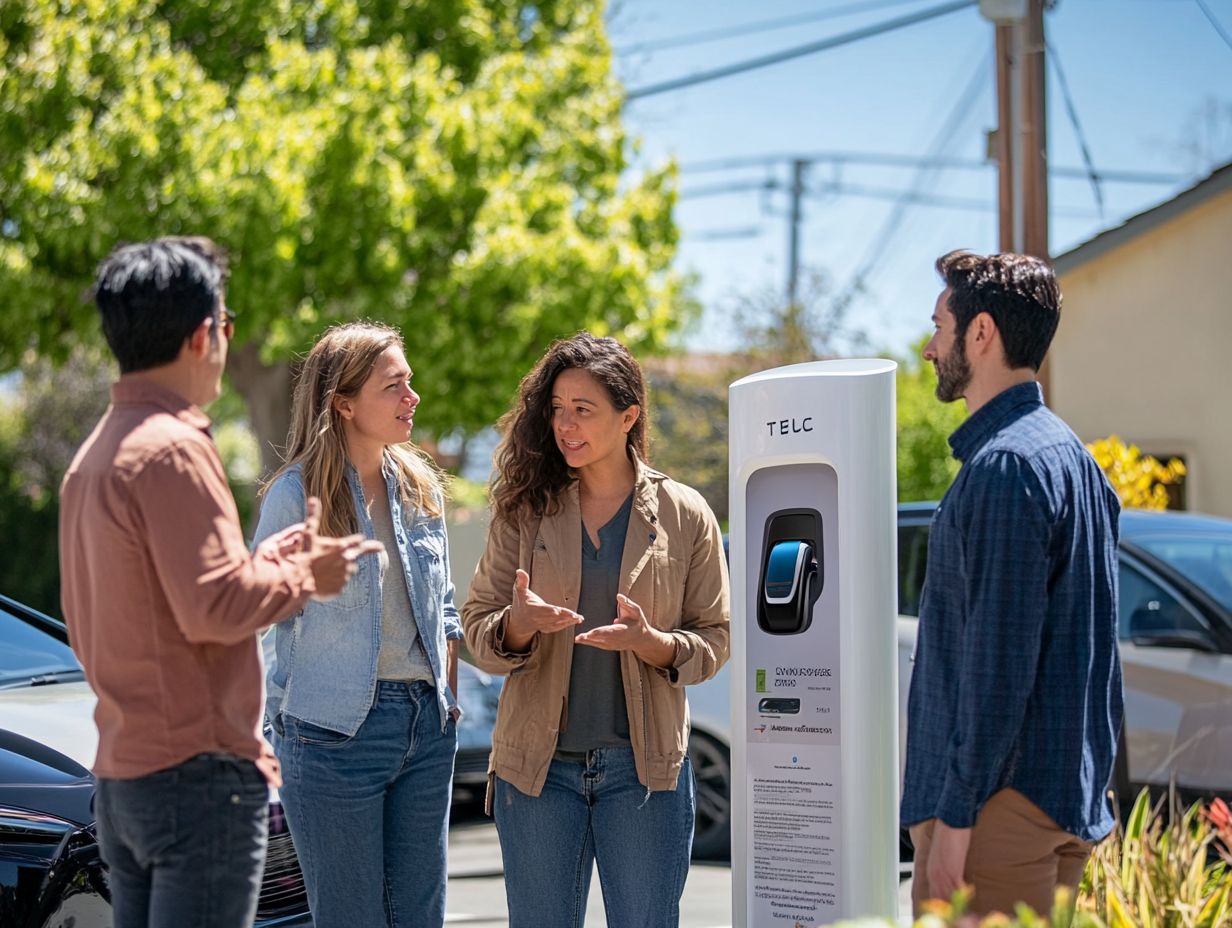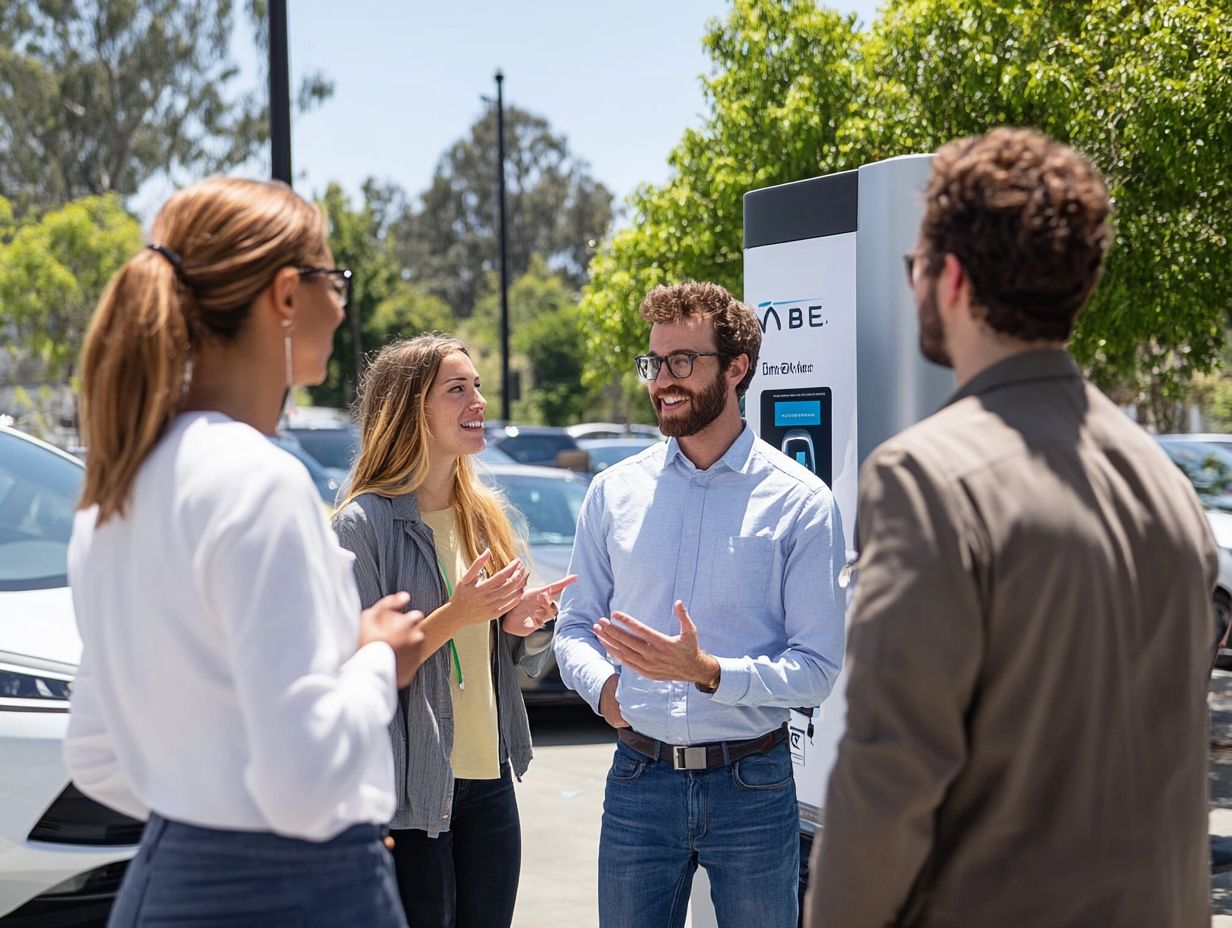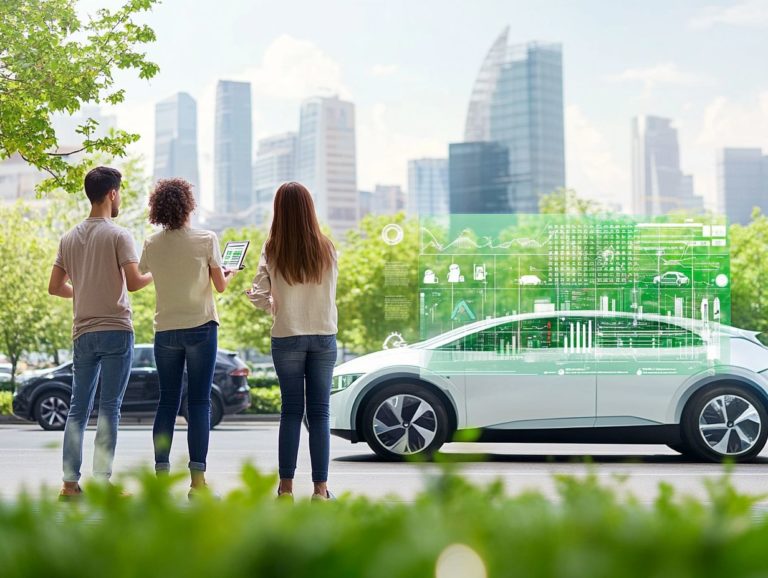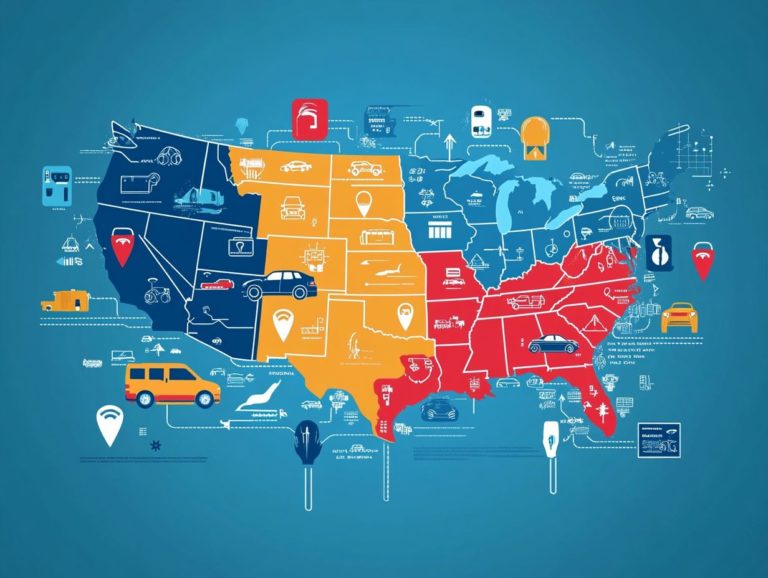what you need to know about ev purchase rebates
Considering the transition to an electric vehicle (EV)? Familiarizing yourself with the financial incentives available can simplify your decision.
This article outlines the various types of EV purchase rebates, ranging from tax credits to rebate programs, along with the eligibility requirements you will need to fulfill.
You will receive comprehensive guidance through the application process, complete with tips for maximizing your savings while addressing potential drawbacks.
Prepare to unravel the complexities of EV rebates and empower yourself to make an informed choice!
Contents
Key Takeaways:

Take advantage of tax credits and rebate programs to save money on your EV purchase.
Eligibility requirements, such as income and vehicle requirements, may vary depending on the rebate program.
Maximize your savings by following a step-by-step guide and utilizing tips and tricks for EV purchase rebates.
Understanding the Basics
Understanding the basics of the EV tax credit is important for anyone contemplating the purchase of an electric vehicle. This financial incentive promotes eco-friendly driving. It fluctuates based on factors like battery capacity, manufacturer’s specifications, and purchase price.
As electric cars gain traction in the market, it’s important for you to understand the array of tax incentives available both federal credits and state-specific benefits that can substantially affect your overall expenses while supporting clean energy initiatives.
Types of EV Purchase Rebates
When you delve into the world of EV purchase rebates, you will discover a range of financial incentives designed to make your transition to electric vehicles smoother.
These incentives include tax credits that can significantly decrease your tax burden and rebate programs that provide direct financial benefits right at the point of sale.
By understanding the distinctions between federal credits, state incentives, and dealership discounts, you can boost your savings whether you are looking to acquire a new vehicle or capitalize on credits for used ones.
Tax Credits
Tax credits for electric vehicles represent a vital financial incentive that can dramatically lower your total cost of ownership. The EV tax credit, established by the IRS (Internal Revenue Service), allows you to deduct a significant amount from your tax liabilities when purchasing a new electric vehicle. This federal credit can serve as a game-changer for anyone looking to invest in clean energy alternatives while simultaneously reducing overall tax deductions.
To qualify for these credits, you must meet specific eligibility criteria, including income limits, and ensure that your vehicle complies with certain IRS guidelines. It’s important to note that the credit amount can vary based on factors such as battery capacity and the manufacturer s sales. To maximize your savings, you should check these specifications meticulously before making a purchase.
When it comes time for tax filing, claiming the credit requires you to accurately complete IRS Form 8834, ensuring you provide all necessary documentation as proof of purchase. By understanding these nuances, you can fully leverage the benefits offered by these valuable incentives.
Rebate Programs
Rebate programs present a compelling opportunity for you as a consumer eager to take advantage of financial incentives when purchasing electric vehicles. These programs, available at both state and local levels, can significantly reduce the upfront costs of clean vehicles.
By understanding these rebate offerings, you can navigate the EV market with confidence and maximize your savings. These rebate programs often complement federal tax credits, creating a more robust savings package.
For example, while the federal government offers a tax credit for qualifying electric vehicle purchases, many states have their own initiatives that enhance these benefits. State incentives can range from rebates and tax exemptions to even free charging station installations, and they can vary widely depending on your region. That s why it is essential for you to research what s available in your area.
This synergy between state and federal programs promotes cleaner transportation options by making electric vehicles more financially accessible to you.
Eligibility Requirements

Eligibility requirements for EV rebates and tax credits are key. They determine who can access these financial benefits, making them essential for prospective buyers like you.
Key factors include income limits, which may restrict access to tax credits for higher earners, and specific vehicle criteria that hinge on weight ratings and battery capacity. Understanding these criteria is vital for ensuring your eligibility and maximizing your savings on electric vehicles.
Income Limits
Income limits play a crucial role in determining your eligibility for the EV tax credit, as established by the IRS. These limits ensure that financial incentives are directed toward those who need them most, potentially restricting higher earners from accessing certain tax benefits.
By understanding how these income thresholds relate to your tax return, you can confidently assess your eligibility for EV rebates. Depending on your filing status, the income limits can vary significantly; for instance, single filers often face different thresholds compared to married couples filing jointly.
The IRS specifies limits based on Adjusted Gross Income (AGI), which is your income after certain deductions. Exceeding this limit could disqualify you from receiving the credit. If you’re planning to take advantage of the EV tax credit, it’s essential to document your income accurately.
Mistakes can jeopardize your eligibility and complicate your filing process. Keeping these guidelines in mind will enable you to make informed decisions as you navigate the EV tax credit landscape.
Vehicle Requirements
The vehicle requirements set by the IRS determine your eligibility for the EV tax credit. Factors such as battery capacity and weight rating are influential in this determination. These specifications clarify which electric vehicles qualify for incentives and how elements like the purchase price can affect your financial benefits.
Understanding these requirements is crucial for you as a prospective buyer, enabling informed purchasing decisions. To take full advantage of these incentives, pay close attention to key aspects like the vehicle s battery capacity; generally, larger batteries yield higher credits. The IRS outlines a minimum battery capacity necessary for qualification, promoting the development of more efficient models.
Weight ratings are equally significant; heavier vehicles might face different limitations under the rebate guidelines. Consider the total purchase price including upgrades and extra features since it can influence your eligibility.
Being knowledgeable about these criteria not only streamlines your buying experience but also maximizes the financial perks of choosing an environmentally-friendly vehicle.
How to Apply for EV Purchase Rebates
Applying for EV purchase rebates is your chance to save big! Let s make it easy. A well-structured step-by-step guide can transform the experience into a seamless journey.
To navigate this application process successfully, gather all necessary documentation, including proof of purchase from your dealership, and meticulously complete any required forms for the rebate applications.
By following these essential steps, you can ensure that you fully maximize your benefits when it s time to file your taxes.
Step-by-Step Guide
A comprehensive step-by-step guide for applying for EV purchase rebates can unlock substantial financial savings for you.
- Step 1: Collect your documents, including your vehicle identification number and proof of purchase from your dealership.
- Step 2: Familiarize yourself with the specific eligibility criteria outlined by local or federal programs, as these can differ. Understanding vehicle classifications and purchase limits is crucial for a successful application.
- Step 3: Once your documents are in order, complete the application accurately, ensuring any required forms are included with your submission.
- Step 4: After you’ve applied, keep a close eye on the application status to guarantee timely processing.
Talk to a financial advisor to boost your chances of success! Consider leveraging online resources to enhance your understanding of the rebate landscape. Being aware of deadlines and potential updates can significantly improve your chances of approval, making the entire process far more seamless.
Don t wait! Start gathering your documents today to secure your EV rebates!
Maximizing Your Savings

Maximizing your savings when purchasing an electric vehicle requires a keen understanding of the different money-saving options available in the EV market.
Beyond the foundational EV tax credit, explore dealership discounts, state incentives, and additional rebates that can significantly boost your cost savings.
By thoroughly researching various EV options and learning how to leverage these incentives effectively, you can make well-informed purchasing decisions that align with your financial goals.
Tips and Tricks
Shopping for an electric vehicle can be thrilling! Here are ways to save money:
Begin by familiarizing yourself with all available financial incentives, including tax credits and rebates. Don t shy away from negotiating with dealerships for better terms.
Look at different EV options and check manufacturer rules to save more when you buy.
Buy at the right moment! Manufacturers often have seasonal sales that can save you big.
Research user reviews and reputable comparison sites for valuable insights into the total cost of ownership. This includes all the costs of owning an EV, including maintenance and charging.
Don t underestimate the advantages of joining online forums or local EV clubs; these community spaces are goldmines for shared experiences and tips.
This collective knowledge can reveal lesser-known discounts and financing options tailored for electric vehicles, ensuring your buying journey is both informed and enjoyable.
Potential Drawbacks of EV Purchase Rebates
While EV purchase rebates present enticing financial incentives, it’s crucial to weigh the potential drawbacks and limitations involved. These drawbacks may include restrictions tied to income thresholds or specific vehicle eligibility, which can complicate your purchasing journey.
By grasping these challenges, you enable yourself to make informed decisions and prepare for any potential tax implications when claiming these incentives.
Possible Limitations and Disadvantages
Possible limitations and disadvantages of EV purchase rebates can significantly influence the overall benefits you receive. Factors like strict eligibility criteria, income limits, and specific vehicle requirements can restrict your access to financial incentives that make owning an electric vehicle more attractive.
Being aware of these limitations is essential to maximize your savings effectively. Certain rebates may apply only at the time of purchase, which can pose a challenge if you finance your EV through loans and want to fully capitalize on the savings.
Additionally, not all states offer the same incentives, and the variability in local tax laws can impact your tax liability.
As more people embrace electric vehicles, there s also the potential for rebate amounts to decrease, which could diminish the effectiveness of these incentives over time. Moreover, financial aid programs may impose restrictions that disproportionately affect middle-income earners, creating an uneven landscape for electric vehicle affordability.
Frequently Asked Questions
1. What are EV purchase rebates and how do they work?

EV purchase rebates are financial incentives offered by governments or utility companies to encourage the purchase of electric vehicles. These rebates typically come in the form of a monetary discount or tax credit on the purchase price of an EV. The exact amount and eligibility requirements vary by location.
2. Who is eligible for EV purchase rebates?
The eligibility requirements for EV purchase rebates can vary, but generally, individuals who purchase or lease a new electric vehicle are eligible. Some rebates may have income limitations or be restricted to certain types of EVs. It’s important to check with your local government or utility company to determine if you qualify.
Ready to explore local incentives and start your EV purchasing journey? Take the first step today!
3. Unlock Savings with EV Rebates!
You can save a lot with an EV purchase rebate, but it depends on where you live and the specific offer. Rebates can be anywhere from a few hundred to several thousand dollars.
4. Consider the Downsides of EV Rebates
EV purchase rebates are fantastic, but they have some downsides. They vary by location, so not everyone can get them. Some rebates have strict rules about which models qualify.
5. How to Apply for Your EV Rebate
Applying for an EV purchase rebate depends on where you are and the program. Usually, you ll need to fill out an application and show proof of buying or leasing an electric vehicle.
6. Other Exciting Incentives for EV Owners
There are more incentives out there beyond rebates! Look for tax credits, free charging stations, and even lower insurance rates to maximize your savings.






